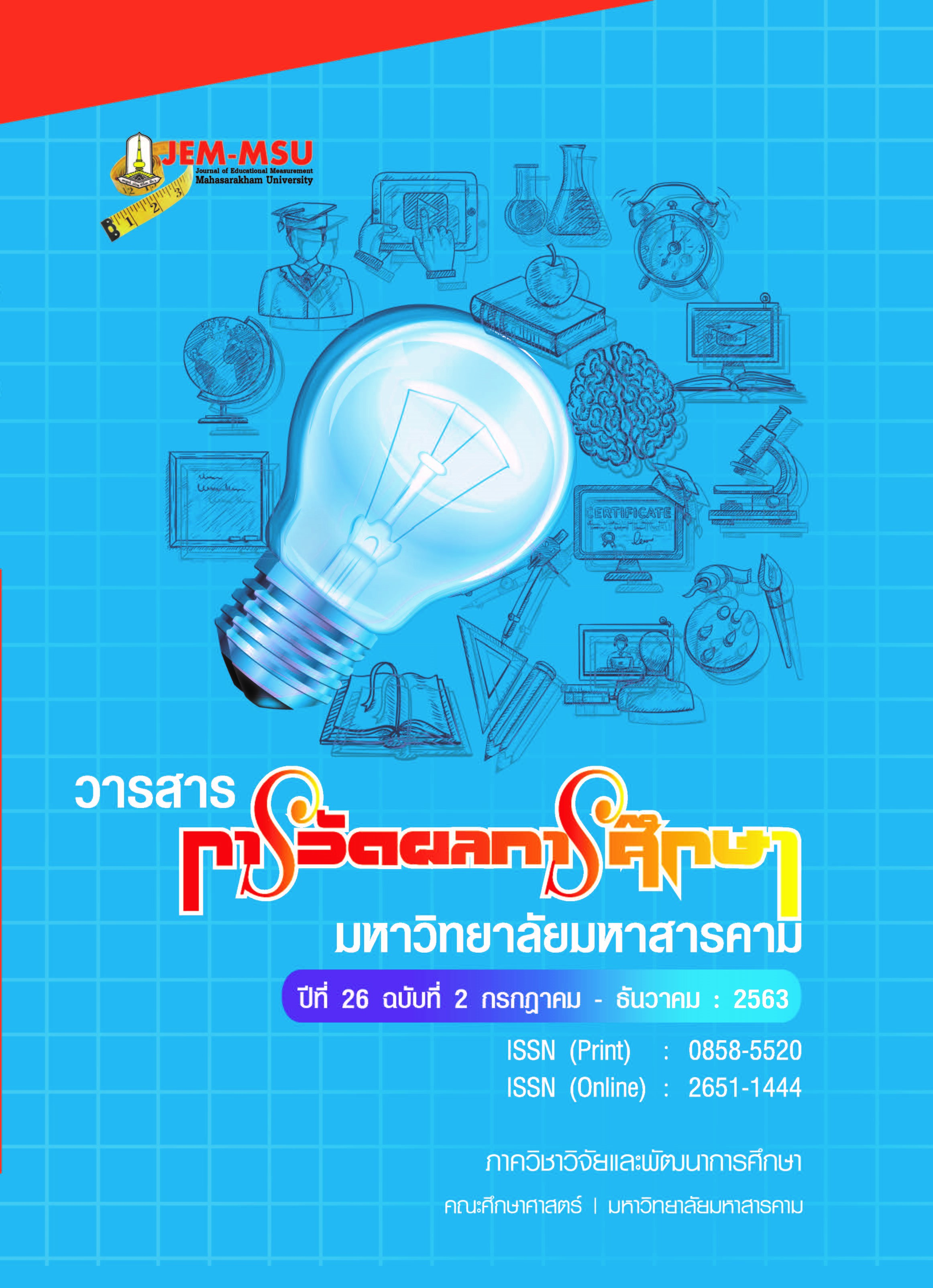The Causal Factors Influencing Mathematics Literacy in the 21st Century and Development of a Model to Promote Mathematics Literacy in the 21st Century For Grade 9 Students under the Secondary Education Service Area Office 26
Main Article Content
Abstract
The purposes of this research were: 1) to study the causal factors Influencing mathematics literacy in the 21st century for grade 9 students under the Secondary Education Service Area Office 26; 2) to find guidelines on promotion of the mathematics literacy in the 21st century for grade 9 students under the Secondary Education Service Area Office 26. The sample consisted of 700 grade 9 students under the Secondary Education Service Area Office 26, obtained through multistage random sampling, and 5 teachers from the Mathematics Learning Strand, under the Secondary Education Service Area Office 26, obtained through purposive sampling. The research instruments were: 1) a mathematics basic knowledge test; 2) a learning aptitude test; 3) a test on mathematics literacy in the 21st century; 4) a test on factors influencing mathematics literacy in the 21st century; and 5) a structured interview inquiring guidelines on promotion of the mathematics literacy in the 21st century for grade 9 students under the Secondary Education Service Area Office 26.
The findings revealed that: 1) the model that had been developed was consistent with the empirical data, as seen from = -181.02, df = 135, p = 1.0000, RMSEA=0.000; 2) the variable that had a direct influence on mathematics literacy of students was the attitude towards mathematics. The variables with direct and indirect influences were basic knowledge of mathematics, learning aptitude, achievement motive, and self-confidence; 3) from in-depth interviews with the teachers from the Mathematics Learning Strand on guidelines on promotion of the mathematics literacy in the 21st century of grade 9 students under the Secondary Education Service Area Office 26, guidelines were proposed as follows: mathematics teachers should be promoted and developed to have good knowledge of the content taught, having in-depth and thorough knowledge in related content; learning activity organizing should be promoted and developed; in organizing for learning mathematics, it is extremely necessary to encourage students to build the body of knowledge by themselves; measurement and evaluation should be promoted; the teacher should use various methods of assessment; and student promotion and promotion of the educational institution were also proposed.
Article Details
The content and information contained in the published article in the Journal of Educational Measurement Mahasarakham University represent the opinions and responsibilities of the authors directly. The editorial board of the journal is not necessarily in agreement with or responsible for any of the content.
The articles, data, content, images, etc. that have been published in the Journal of Educational Measurement Mahasarakham University are copyrighted by the journal. If any individual or organization wishes to reproduce or perform any actions involving the entirety or any part of the content, they must obtain written permission from the Journal of Educational Measurement Mahasarakham University.
References
กรมวิชาการ. (2537). คู่มือสื่อสารพัฒนาความเชื่อมั่นในตนเอง. กรุงเทพฯ : โรงพิมพ์การศาสนา.
กระทรวงศึกษาธิการ. (2551). หลักสูตรแกนกลางการศึกษาขั้นพื้นฐาน พุทธศักราช 2551. กรุงเทพฯ :โรงพิมพ์ชุมนุมสหกรณ์การเกษตรแห่งประเทศไทย.
โครงการ PISA ประเทศไทย สถาบันส่งเสริมการสอนวิทยาศาสตร์และเทคโนโลยี. (2554). กรอบโครงสร้างการประเมินผลนักเรียนนานาชาติ PISA 2009. กรุงเทพฯ : อรุณการพิมพ์.
ถวิล ธาราโภชน์. (2547). พฤติกรรมมนุษย์กับการพัฒนาตน. กรุงเทพฯ : ทิพยวิสุทธิ์.
ธีรภาพ วัฒนวิจารณ์. (2545). ความเชื่อมั่น. นิตยสารผู้จัดการ, 19(2), 127-128.
ปรียาพร วงค์อนุตรโรจน์. (2551). จิตวิทยาการศึกษา. กรุงเทพมหานคร : ศูนย์สื่อเสริมกรุงเทพ.
มณิภา เรืองสินชัยวาณิช. (2551). ปัจจัยเชิงสาเหตุที่มีอิทธิพลต่อผลสัมฤทธิ์ทางการเรียนวิชาคณิตศาสตร์ของนักเรียนชั้นมัธยมศึกษาปีที่ 3 ในเขตเทศบาลเมืองศรีสะเกษ จังหวัดศรีสะเกษ. วิทยานิพนธ์ กศ.ม. มหาสารคาม : มหาวิทยาลัยมหาสารคาม.
ล้วน สายยศ และอังคณา สายยศ. (2543). การวัดด้านจิตพิสัย. กรุงเทพฯ : สุวีริยาสาส์น.
ศักดา บุญโต. (2544). คณิตศาสตร์มหัศจรรย์คู่มือการจัดการศึกษาสำหรับผู้มีความสามารถพิเศษ. กรุงเทพฯ : พิมพ์ดี.
ศิลปะชัย ซื่อตรง. (2555). ปัจจัยเชิงสาเหตุที่มีอิทธิพลต่อผลสัมฤทธิ์ทางการเรียนกลุ่มสาระการเรียนรู้คณิตศาสตร์ ชั้นมัธยมศึกษาปีที่ 2 สังกัดสำนักงานเขตพื้นที่การศึกษากาฬสินธุ์ เขต 3. วิทยานิพนธ์ กศ.ม. มหาสารคาม : มหาวิทยาลัยมหาสารคาม.
สิริพร ทิพย์คง. (2544). การแก้ปัญหาคณิตศาสตร์ หนังสือเสริมประสบการณ์วิชาคณิตศาสตร์ ระดับประถมศึกษาและมัธยมศึกษา. กรุงเทพฯ : คุรุสภาลาดพร้าว.
สุพักตรา สำราญสุข. (2552). ปัจจัยที่มีอิทธิพลต่อผลสัมฤทธิ์ทางการเรียนวิชาคณิตศาสตร์ของนักเรียนชั้นมัธยมศึกษาปี ที่ 3 ภาคตะวันออกเฉียงเหนือ. วิทยานิพนธ์การศึกษามหาบัณฑิต มหาวิทยาลัยมหาสารคาม.
สุภมาศ ถานโอภาส. (2555). ปัจจัยเชิงสาเหตุที่มีอิทธิพลต่อผลสัมฤทธิ์ทางการเรียนกลุ่มสาระการเรียนรู้คณิตศาสตร์ของนักเรียนชั้นประถมศึกษาปีที่ 5 จังหวัดศรีสะเกษ. วิทยานิพนธ์ กศ.ม.มหาสารคาม : มหาวิทยาลัยมหาสารคาม.
อัจฉรา จันทรเสนา. (2555). ปัจจัยบางประการที่สัมพันธ์กับผลสัมฤทธิ์ทางการเรียนกลุ่มสาระการเรียนรู้คณิตศาสตร์ ชั้นประถมศึกษาปีที่ 6 โรงเรียนสังกัดเทศบาลนครอุดรธานี. วิทยานิพนธ์ กศ.ม.มหาสารคาม : มหาวิทยาลัยมหาสารคาม.
Bloom, B.S. 1976. Haman Characteristics and School Learning. New York : McGraw- Hill Book Company, 1976.


